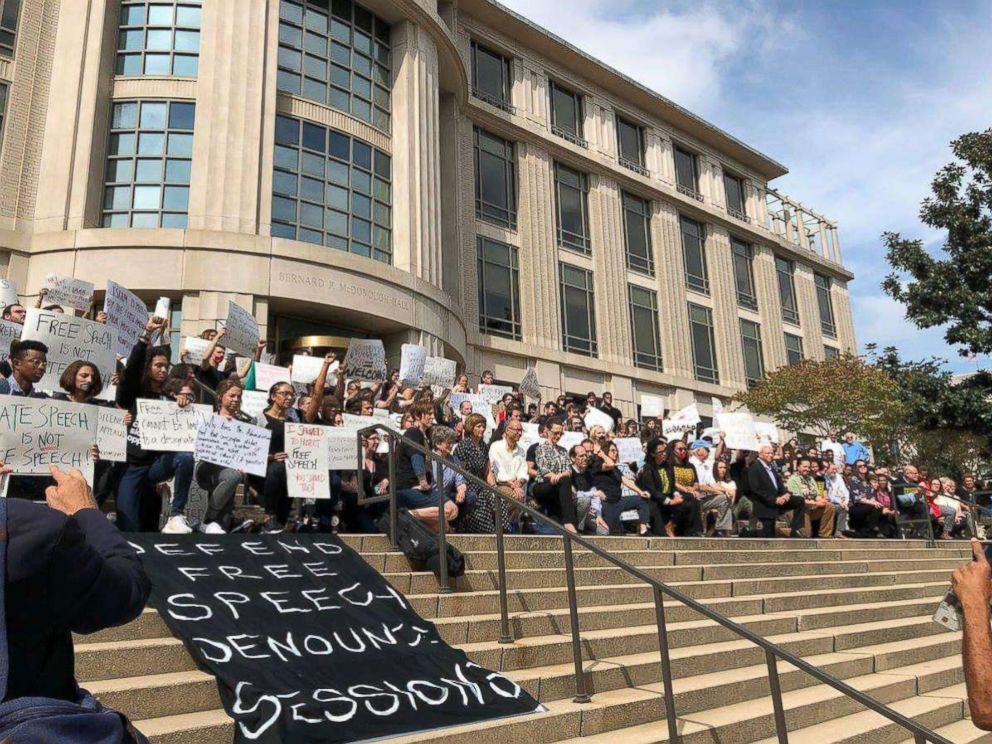Sessions says free speech 'under attack,' but defends Trump's NFL battle
The attorney general spoke at Georgetown University today.
— -- U.S. Attorney General Jeff Sessions today defended the president’s recent criticism of NFL protests, telling an audience at Georgetown University in Washington, D.C., that the "president has free speech rights, too.”
He called the protests by NFL team owners and players a “big mistake,” adding that it will “weaken the commitment we have to this nation.”
Sessions' speech, which focused on First Amendment rights, came amid President Donald Trump's rants against NFL players who take a knee during the national anthem, suggesting in a tweet this morning that the NFL should establish rules barring players from kneeling.
Several students, dressed in "Black Lives Matter" T-shirts, sat silently with tape over their mouths as Sessions addressed the audience.
The attorney general, who was hosted by the Georgetown Center for the Constitution at Georgetown University Law Center, faced backlash even before the event began.
Before Sessions took the stage, Georgetown Law faculty and others knelt outside in protest of his speech. A group of more than 30 Georgetown Law Center faculty members also condemned the "hypocrisy" of his speech.
"We acknowledge our colleague's right to invite Attorney General Sessions to speak on campus. However, we, the undersigned, condemn the hypocrisy, about Attorney General Jeff Sessions speaking about free speech," according to a statement from the group.
"Attorney General Sessions is a key cabinet member in an administration headed by a president who spent last weekend denouncing athletes engaged in free expression and calling for them to be fired. President Trump calls African-American professional football players kneeling in quiet protest 'sons of bitches' and angry, armed white supremacists 'very fine people,'" the statement continued.

During his remarks, he announced that the Department of Justice is filing a statement of interest in a campus free speech case this week and we will be filing more in the weeks and months to come.
"We will enforce federal law, defend free speech, and protect students’ free expression from whatever end of the political spectrum it may come," he said in prepared remarks.
Sessions spoke specifically about a public college in Battle Creek, Michigan, where he said a state official had students jailed for handing out copies of the United States Constitution last year.
"Freedom of thought and speech on the American campus are under attack. The American university was once the center of academic freedom, a place of robust debate, a forum for the competition of ideas. But it is transforming into an echo chamber of political correctness and homogeneous thought, a shelter for fragile egos," Sessions said.
He derided student codes of conduct related to speech that he said "substantially infringe on constitutionally protected speech."
Sessions gave examples of Boise State University in Idaho, where, he said, the Student Code of Conduct prohibits "[c]onduct that a reasonable person would find offensive." At Clemson University in South Carolina, the Student Code of Conduct bans any verbal or physical act that creates an "offensive educational, work or living environment," said Sessions.
"Who decides what is offensive and what is acceptable? The university is about the search for truth, not the imposition of truth by a government censor," he said.
Sessions also railed against "free-speech zones" on campus, saying that they are "eerily similar to what the Supreme Court warned against" in its 1969 Tinker v. Des Moines decision.
During his remarks, Sessions blamed school administrators for favoring "heckler’s disruptive tactics" over a speaker’s First Amendment rights.
Sessions said the "university is "where the next generation of Americans are equipped to contribute to and live in a diverse and free society filled with many, often contrary, voices."
"And let me be clear that protecting free speech does not mean condoning violence like we saw recently in Charlottesville. Indeed, I call upon universities to stand up against those who would silence free expression by violence or other means on their campuses," he said.




